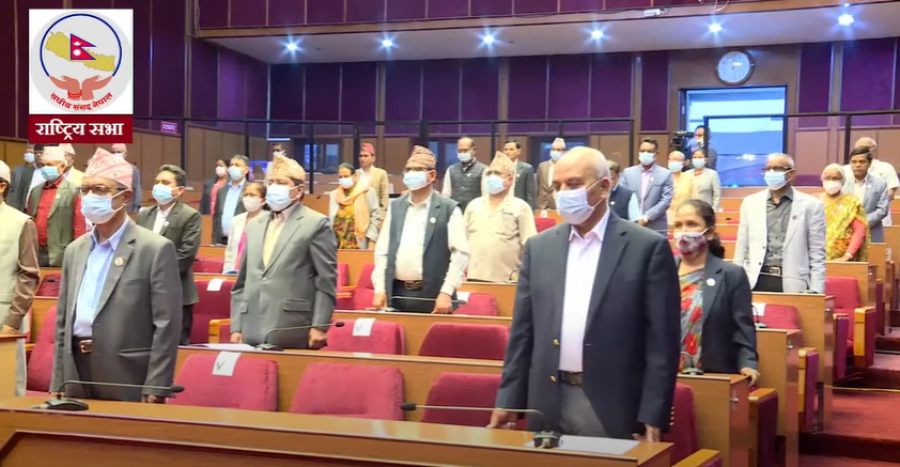Politics
UML’s partisan politics enters upper house, as members demand Speaker’s resignation
Observers say Nepali parties have failed to comprehend the spirit of the National Assembly and made it a platform to squabble over petty interests.
Binod Ghimire
A day after the lower house endorsed the budget amid sloganeering by CPN-UML lawmakers, it entered the upper house on Tuesday.
The upper house too saw protests from members of the main opposition.
As soon as Ganesh Timilsina, chair of the National Assembly, commenced Tuesday's meeting, those representing the UML stood from their seats in a symbolic obstruction.
Timilsina then allowed Bhairab Sundar Shrestha, a UML member, to voice his concerns.
“The Speaker [Agni Sapkota] failed to maintain the dignity of his position by being complicit in a conspiracy to split the UML,” said Shrestha while speaking at Tuesday’s meeting. “He has to give a way out…which is resignation.”
The UML has been resorting to obstructing both houses ever since their new sessions began on September 8. The party believes Speaker Sapkota played foul by not issuing a notice as per its August 17 decision to expel 14 Members of Parliament. While obstructing the proceedings of the lower house, they demanded Speaker Sapkota’s resignation.
Observers say the UML now has set a bad precedent by taking the issue of the presiding official of the lower house to the upper house, which are envisioned by the constitution to serve different purposes aimed at establishing rule of law and strengthening the parliamentary system.
“The issue must have been limited to the lower house because the National Assembly has nothing to do with it,” Taranath Ranabhat, a former Speaker, told the Post. “The main opposition must stop further degrading the dignity of the National Assembly.”
Nepal has a bicameral system of parliament with each house having its own constitutional role to play.
The House of Representatives is temporary in nature while the National Assembly is a permanent entity.
The National Assembly is also called the “house of elders” for the role it has to play, which includes discussion and endorsement of the laws, holding the executive accountable and recommending changes in the bills endorsed by the lower house if necessary.
While the lower house in many parliamentary democracies can be rowdy, disorderly and chaotic, the upper house attempts to remain a place where informed and intellectual debates on issues of national and social interests, as well as bills introduced by the government, are held.
However, the upper house in Nepal, which has failed to make its presence felt ever since it came into being a little over three years ago, has turned into a platform for shadow boxing for political parties. And now it has been overshadowed by the UML.
Khim Lal Devkota, an independent member in the upper house, said the hallowed chamber is losing its significance and that the recent obstruction purely stems from the tussle between the UML and Speaker Sapkota.
“The UML is setting a wrong precedent by bringing the issue of the Speaker's resignation to the National Assembly,” said Devkota. “Timilsina must have intervened when the UML was demanding the Speaker's resignation in the upper house.”
It’s not that Speaker Sapkota’s action is not questionable, as argued by the UML.
Almost two weeks after the UML informed the Parliament Secretariat about its decision to expel its lawmakers, Sapkota in a statement said there was no need to issue a notice as they had formed a new party. The UML, however, believes that the Speaker deliberately delayed the issuing of the notice, as an ordinance to amend the Political Parties Act was on the way, facilitating the split of a party.
Observers, however, say two wrongs don’t make a right and that if the UML has an issue with the Speaker, it should not encourage its members in the upper house to obstruct proceedings raising the same issue.
UML chair KP Sharma Oli has even filed petitions against the Speaker and the Election Commission over the issue.
On September 2, Oli moved the Supreme Court, arguing that Speaker Sapkota’s decision not to oblige with the UML’s decision to expel 14 lawmakers was wrong and that the Election Commission failed to abide by the existing legal provisions as it registered the CPN (Unified Socialist).
Madhav Nepal registered the CPN (Unified Socialist) with the Election Commission on August 26, and the party is a partner in the Sher Bahadur Deuba government.
The Supreme Court on Tuesday refused to issue an interim order in response to Oli’s petitions. It has asked the defendants—Speaker Sapkota and the Election Commission—to furnish original copies of their decisions.
Observers and experts on parliamentary affairs, however, say the more the National Assembly is kept above partisan interests, the better it is for parliamentary democracy.
Devkota says there is also a need to understand the basic rules laid down for lawmakers.
“Rule 21 of the National Assembly and House of Representatives Regulations says the decisions by the chairperson or the Speaker cannot be questioned,” said Devkota. “Similarly, Article 105 of the Constitution of Nepal bars the federal parliament from holding discussions on sub judice cases.”
According to Devkota, the UML is using the platform of the National Assembly to flout the constitution and the law. “This is definitely not a good sign for a functional democracy,” he told the Post.
Som Bahadur Thapa, a former secretary at the Parliament Secretariat, said the primary duty of the elected representatives in both houses is to make laws and they should be the ones who should know and understand the laws.
“If the main opposition has challenged Sapkota’s decision in the court of law, it should wait for the court’s verdict,” said Thapa. “It has to stop obstructions some day, sooner or later. So the sooner it does the better it is. Not only for them but also for parliamentary democracy and the party itself.”




 13.12°C Kathmandu
13.12°C Kathmandu














